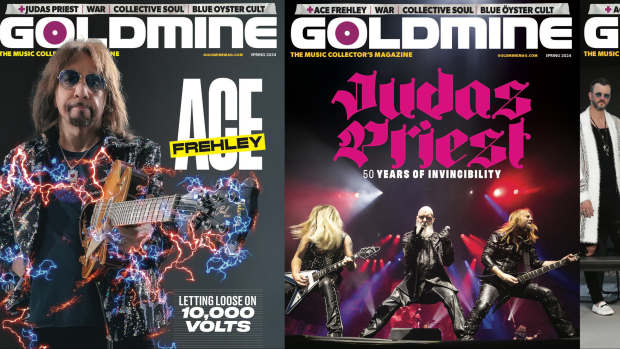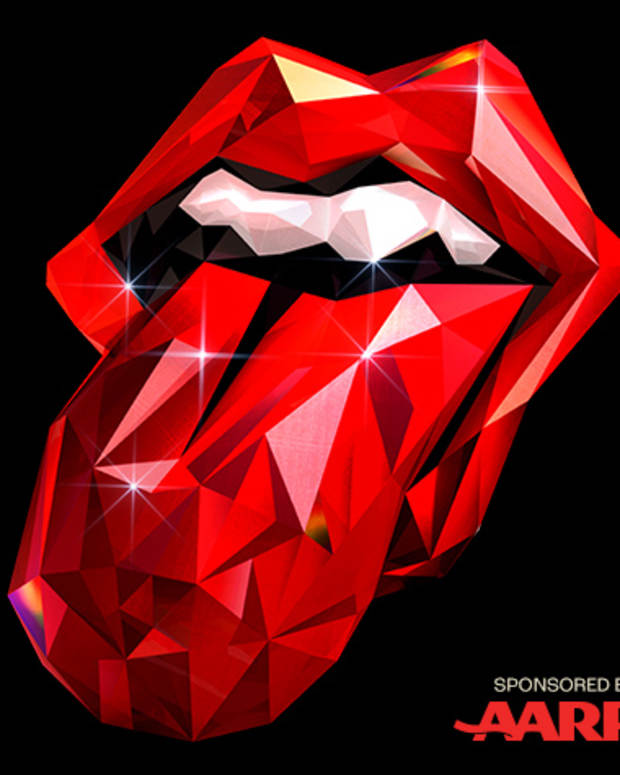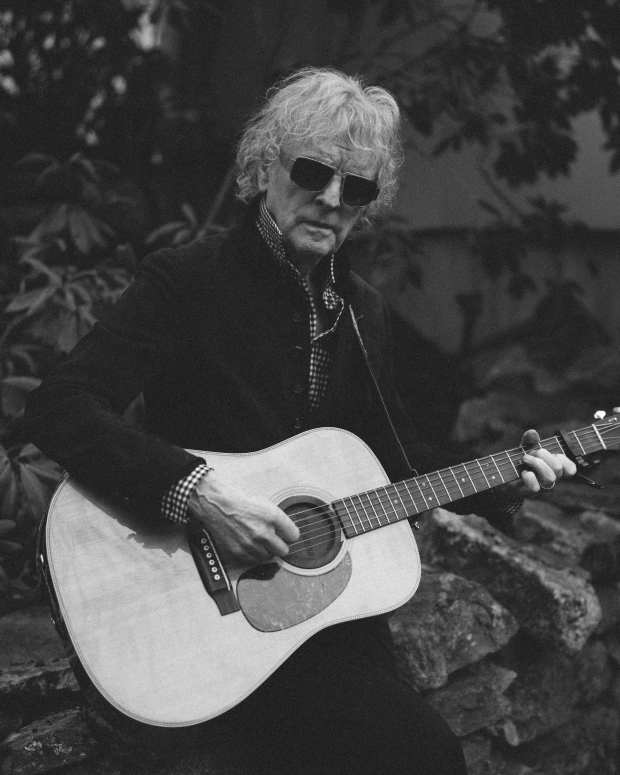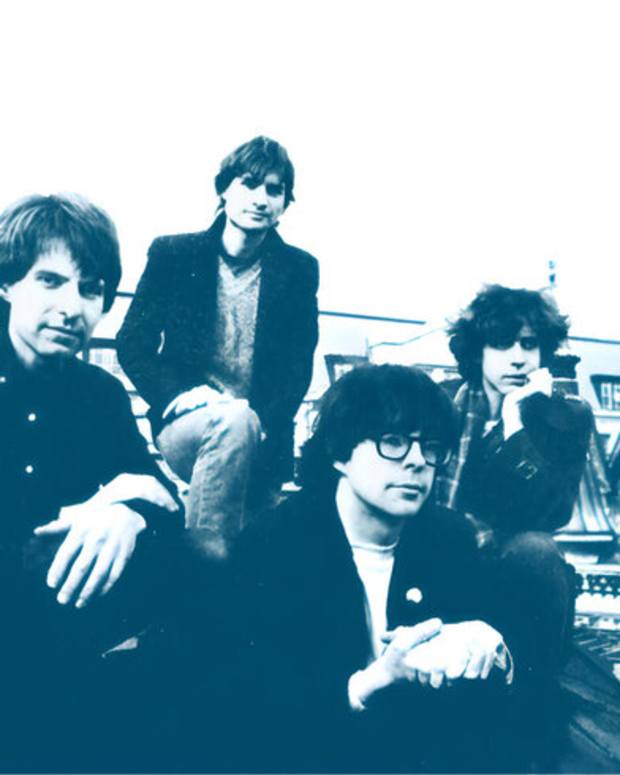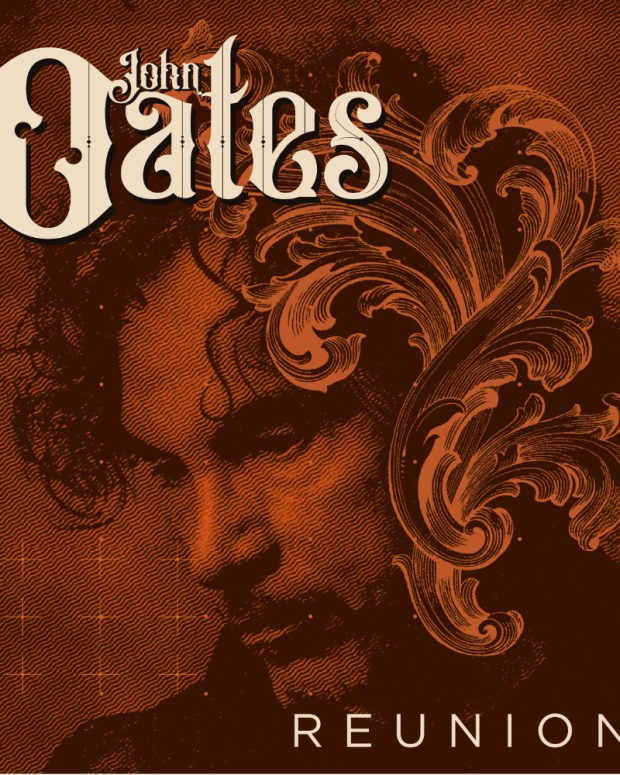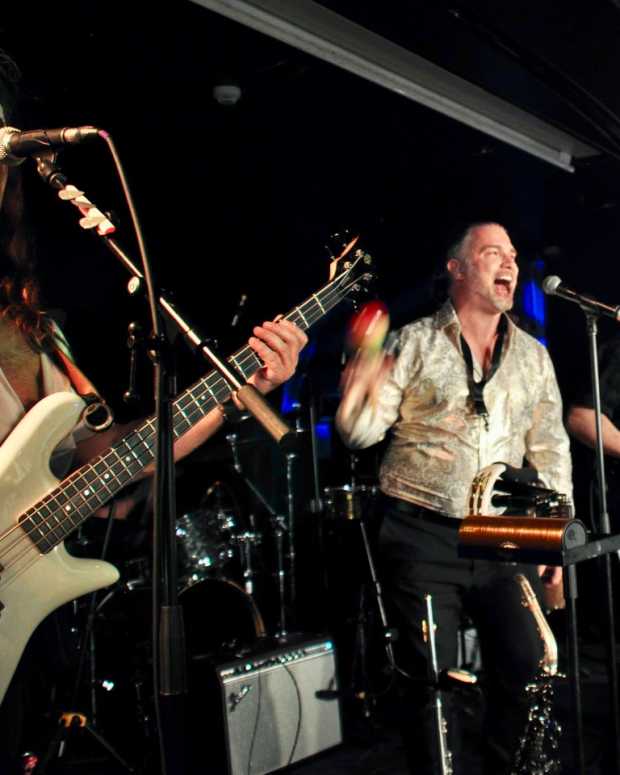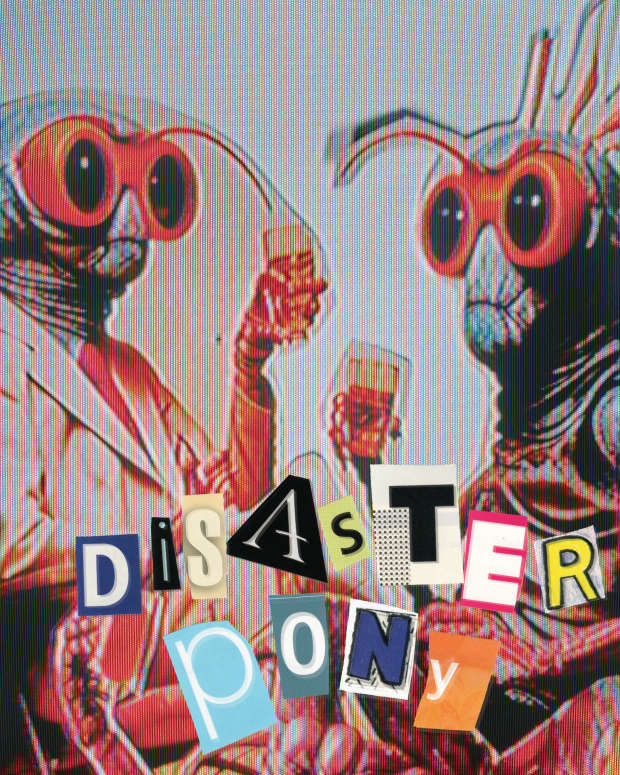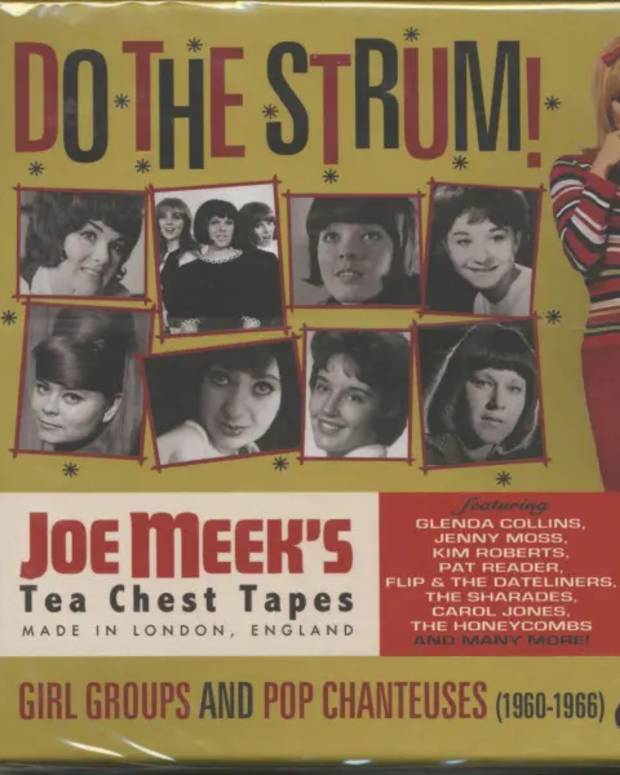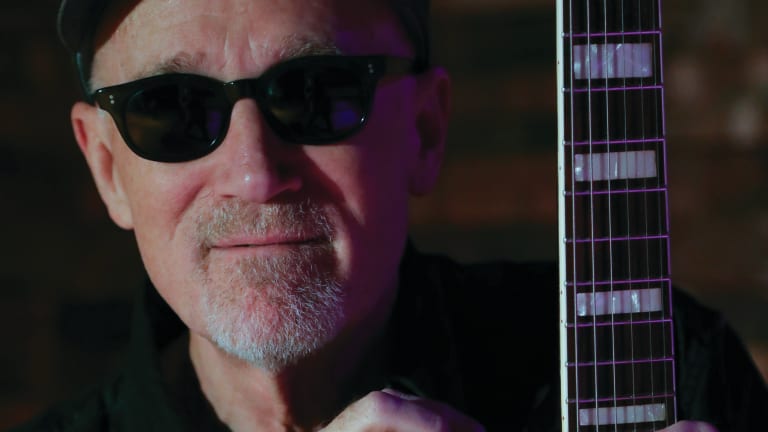
On the 40th anniversary of his debut album, Marshall Crenshaw discusses its genesis
By Ken Sharp
When Marshall Crenshaw’s landmark debut album hit record stores in late spring of 1982, it was greeted with unanimous acclaim from critics and the public alike as a masterpiece of exquisite songwriting and performance. With the 40th anniversary release of his self-titled first album (a special Record Store 2-LP vinyl release was issued in November 2022, followed by a release in January 2023 in all formats), the masterpiece gets even better with a remastering that brings out the bottom end of the sound, providing a richer and more full-bodied listening experience. Supplemented by a bonus EP culling demos and studio cuts, Crenshaw’s debut album is a timeless jewel that shines gloriously.
Join us for a conversation with Marshall Crenshaw as he looks back at the making of his first album.

Get the 'MARSHALL CRENSHAW' CD (40th Anniversary, Deluxe Edition) in the Goldmine shop by clicking the image above.
GOLDMINE: When did you first start writing your own songs?
MARSHALL CRENSHAW: I really started getting into songwriting about 1979. I hooked up with these guys that I had known back in Michigan named Rick Cioffi and Fred Todd. They were a songwriting team that wanted to be like Chinn and Chapman, or Bjorn and Benny, etc., and I liked their stuff. What happened was they came out to New York to try and get a publishing deal, and while they were there, they visited me at a Beatlemania rehearsal. Rick badgered me to get into songwriting. He said, “Hey look, it’s simple. You know the song ‘When You Walk in the Room’ by Jackie DeShannon?’” I said, “I know it well, it’s one of my all-time favorites.” He said, “Well, take that song: It starts off with a riff. You build a verse around the riff, then you do another verse and you have a bridge and a solo, and then you’re out. Bang!” Rick also used to go around saying, “Boston meets The Searchers, man, Boston meets The Searchers. That’s the formula.” He just insisted, in a friendly way, that I start writing songs with them, so I did, but then quickly started doing it on my own at the same time.
GM: Marshall, when you were shopping for a record deal, what were the songs on your demo tape?
MC: Let me see. I started shopping it in maybe March of 1980, and my method of shopping was to go into New York City with a bag of cassettes; the cassette would have maybe like three or four songs on it, not the whole album. I had this list of addresses of places in the music business that I got from my brother’s boss. My brother, Robert, worked at a rehearsal studio at this time, and he got this list, and it was addresses of record producers and publishers and production companies and record companies. I would make four or five stops on one of these trips, and I would drop off and sprinkle the tapes around New York City and I got callbacks immediately. One of the first key responses that I got, which wound up opening a lot of doors, was when I heard from Robert Gordon. I’d given a tape to the doorman at Richard Gottehrer’s apartment building. Richard was managing and producing Robert Gordon at the time, and about a week after I dropped the tape off, I got a message on my answering machine from Robert Gordon. I just knew for a fact when I heard that message, I just thought, Well, this is going to change my life. And it did. So that was the first domino that fell because within a few months of that phone message, Robert Gordon’s version of “Someday, Someway” was a hit on WNEW in New York. And then a little while after the Robert Gordon thing, I got a call back from a guy named Alan Betrock. I dropped the tape off at the office of his record company, Shake Records. And again, these tapes that I would drop off might have three or four songs. They weren’t always the same songs. They were just different ones that I would grab from my stockpile, and the one that Alan heard that got him excited was one called “Something’s Gonna Happen.” When he called me back, he just said right away, “Let’s make a record,” and we did so on the heels of Robert’s version of “Someday, Someway” being played on WNEW. They also added my single. So that’s really what blew everything open, having two songs simultaneously on WNEW before I had a record deal. We were also playing in the clubs and things were kind of snowballing for us on the live scene. But as far as what the songs were, they were just miscellaneous ones that would be on these cassette tapes.
GM: How many labels were interested, and who were the labels interested in signing you?
MC: Finally, in the end, every publisher and every record company was looking at us, and we were getting a lot of high-profile press before we were on a label. But in the end, it was down to Warner Bros. and RCA. They were the two that really put serious offers on the table at the same time. It was like a little bit of a bidding war thing between those two.
GM: And was it your fondness and connection with Warner Bros. A&R rep Karin Berg that sealed the deal?
MC: I would say that, yeah. It was on a personal level that I felt a connection with them because RCA was offering more money. But it was an emotional choice. A lot of the business choices I made back then were haphazard. I’m not saying that that was a haphazard choice, but it was an emotional choice maybe less than it was a pragmatic choice. But yeah, it was really down to the people at Warner Bros. and it wasn’t that I didn’t like the people at RCA, but I only knew two people there. It was a totally different kind of hang socially than Warner Bros. was. It was fun to go to Warner Bros. and go out to lunch with six or seven interesting people, more fun than go and have lunch at RCA in a conference room with no windows. It’s just different and more corporate.
Get the print issue this article originally ran in, which includes more content and photos on Marshall Crenshaw, HERE
GM: In terms of producers, was Richard Gottehrer your only choice?
MC: I kind of bullshitted my way into the producer’s chair. I’ll say that now because I just was really uptight about letting go and giving up control because on all these tapes that I shopped around, they were recordings that I made myself, and they had a certain character to them. But I admit now that I didn’t know how to capture that same kind of magic that was on the tapes when I did it myself working in a 24-track studio with all solid-state equipment. And by that time, I’m rerecording the songs. I just didn’t have the right kind of vision about it. I didn’t know how to do it in a studio like that. We did some stuff. One track on the album, “Cynical Girl,” that’s a leftover from what I was producing. The only thing that changed was when Richard came he said, “Get rid of that keyboard bass, that sounds terrible, and put a Fender bass on it, and it’ll be great,” so I followed that advice. After I started producing it by myself, I knew that it wasn’t working, and everybody else was telling me that it wasn’t working, and I’m like, yeah, I’m not feeling right about it either. I did reach out to Richard because I knew him. I worked with him on some Robert Gordon stuff, and I was comfortable with him and also, he had a No. 1 album right at that minute with The Go-Go’s Beauty and the Beat album, so I figured the record company would be OK with that. So he came in, and he was glad to do it because we liked each other.
GM: You had a lot of material you brought in, but once you got signed, were there a few new songs you wrote for the project?
MC: No, it was all from my stockpile. I had maybe 25 songs in my stockpile, and the whole batch of them was written during ’79 to ’81.
GM: One of your best songs, “Starless Summer Sky,” was written around that time but you passed on recording it for your first album, why?
MC: We just didn’t record that for the first album. I don’t regret not including that song. At the time, it didn’t seem like it fit in with what I thought our sound was. “Someday, Someway” was more representative. It was a groove-driven song. So the difference between “Starless Summer Sky” and the other songs is that I co-wrote that one with these guys from the Detroit area, and they had their own sensibility and I was plugging into that. But the songs that wound up on the first album are mostly my own stuff and vision. One song that I wasn’t going to put on the album was “Someday, Someway,” and this was an example of me getting rescued from my own stupidity, because I just figured people knew it already because of Robert Gordon, and I just thought, Why should I do it? He already did it, and that was kind of a dumb thought. Warner Bros. said, “No, we want you to record it for the album,” and they insisted that I do it, and I did. But now I’m really glad they did that, because our record is much different from Robert’s version. It’s got its own magic definitely. That was one thing where they had an idea that was better than my idea.
GM: Is it true that you wrote your biggest hit “Someday, Someway” in a hotel room?
MC: Yeah, I was in Boston. I had given my notice to leave the Beatlemania show. We were in Boston for five weeks, and during that time I wrote a lot of songs. I’d walk home from the theater at night, sit down with my guitar in front of my ghetto blaster, and I would just bang stuff out. I’d always come up with something immediately like “Someday, Someway.” I also worked on “Not for Me” and “Mary Anne” during that time.
GM: Was “Someday, Someway” always the one mooted to be the first single?
MC: Like I said before, it was really Warner Bros. that had a thing about that song. They just really wanted me to do it, and then as soon as we did it, they immediately jumped on it as the first single. My perspective on the world at that time was really kind of New York centric; it’s where I was right at that moment that I was looking at and thinking about. Robert’s version was a hit in New York. I didn’t really have that broad of a worldview about the whole thing. I figured, OK, people know it is a song of his. It’s his song right now. I was wrong, though. It just turned out that I was wrong.
GM: Speaking of NYC, you’re from Detroit, but you were part of the New York scene, and that was part of who you were at the time. Could you talk a bit about New York City as a character, how life in the Big Apple and what you would witness impacted on the lyrical landscape of the first record and certainly the next record, Field Day, too?
MC: Yeah, certainly just the energy that I got from being there. It was like nothing else I’d ever experienced. I spent most of my life, maybe like the first 23 years of my life, in the same environment and then all of a sudden I left. Before I settled in New York City, I traveled all over the country. I went out to the West Coast thinking I would stay. I wound up traveling all over the west with this bar band, little towns out west. It was just an utterly different planet almost from where I spent most of my life up to that point. Then after that, we’re really getting dug in in New York. And then I go on the road with Beatlemania in a touring company, so I’m spending chunks of time, weeks in all of the major cities of the country, and this is a time when it’s not a really a great time for American cities. But I was seeing all of the cities up close after I’d already seen this other kind of landscape for a long time, just all these impressions of America swimming around in my head, and then being in New York, there was so much inspiration and stimulus happening. Yeah, New York was like the muse.
GM: What were the records that were in the permanent rotation or heaviest rotation in your household when you were writing and recording the first album?
MC: Lots of records, but also lots of radio stations and different radio formats, too. I really loved WKTU and WBLS, which were what you call Urban Contemporary at that time. I used to listen to WLIB-AM during the day a lot, and there was like strictly Caribbean music with reggae and calypso, a lot of dub, reggae. I just loved all that music, and then also there was this show on WNYU called “The Afternoon Show,” which I guess you would call a new wave show. Every week they would do the “Wave Breaker” countdown, and I was really hooked on that for half a minute. There was a station in New York called WPIX that was really an eclectic rock and roll station. They would play a Clash record, and then they would play a Joe Turner record, and then they would play Eddie Cochran, and then they would play Johnny Thunders. It was just all over the place and that really hit home for me. It reminded me of how much I loved FM rock radio when it first started out because it was just anything and everything. So there were records I was into and old records of mine that I was playing, and old records that I was buying. But there was also a lot of radio, and that was all kind of current contemporary stuff at that moment. I also love the DJs and the rock clubs because they really mixed it up at disco music alongside the rock music, and then they started playing hip-hop when that came out. So all these things, it’s all there in the music, really. Maybe you can’t hear it overtly, but it’s all in there somewhere in the stuff that I created at that time.
GM: Speak about the contributions of your your brother Robert on drums and bassist Chris Donato.
MC: We were young, but chronologically I wasn’t really that young; I was 26 when we got that band together. But in every other way I was definitely young, so there’s that. We were young, enthusiastic and everything was new; plus, I was really determined. I thought that I’ve finally got this whole thing figured out. So we just jumped in with both feet and went forward full force and we worked. We would rehearse week in and week out even though once we got the initial body of work together, there weren’t too many new songs added during the two or three years we played together. But we would just play to keep in shape, and I was always fine tuning stuff with them. We were kind of high on life, and we worked at it. And then right away people reacted strongly to what we were doing, and we drew energy from that.
GM: How closely does the first album match your vision?
MC: Well, now my view of it is different than it was when I was in that moment and I was a kid. I still get that it is definitive of that moment. It’s very cool. I think the remastering on this 40th anniversary edition helps me appreciate the record a lot more because we didn’t dump out all the low end. When it was mastered the first time, enough of the low end got dumped out; my voice needs that support from the instruments, and now it’s there because of the way the record’s mastered now and it just makes more sense to me this way. I think our bass player, Chris Donato, is going to like the record more now because he gets a better break on the whole thing than he got the first time around, and you can hear how good he was. I’m really at peace with the record completely. But when I went in and did my second album, which was shortly after I did the first one, to me it was like a corrective exercise; this time I’m not going to do all the things that I did last time that I wish I hadn’t done. But that sounds like I’m knocking my first album, and I don’t feel that way at all about it now.
GM: Your songwriting has always been informed by a wonderful economy. Where did you glean that thinking?
MC: Right around the time that I was doing this stuff, there were other people my age or born right around the same year as me who were making records themselves that were channeling ’50s and ’60s Top 40 radio like I was just because they treasured it. There were The Ramones, whose songs were even shorter than mine, Chrissie Hynde and Blondie, all those artists who came around right at that moment. We all just really revered that kind of song structure and those kind of records. So we just wanted to honor this stuff, that’s really what it was. I think as to why all the songs on my album are around 3:20 tops. I think the longest one might be three minutes and change. That stuff was just in my head and a lot of other people’s heads, too.

Crenshaw at the Record Plant recording studio, New York, January 27, 1982. He was there to record his debut album, Marshall Crenshaw.
Gary Gershoff/Getty Images
GM: What songs from the first album still hold up for you?
MC: I still play “Someday, Someway.” It’s a personal favorite. That one was a real breakthrough for me. I wanted to get into this kind of hypnotic, repetitive mantra-like song structure with that. That’s what “Someday, Someway” is like and “Mary Anne,” too, they’re trance-inducing songs. “Someday, Someway” has this groove that I tried to copy from “Party Doll” by Buddy Knox and a “Lotta Lovin’” by Gene Vincent; records that I loved when I was three or four years old. During this period of songwriting, I was drawing inspiration from songs that would put me in touch with childhood memories ’cause I really loved rock and roll when I was a kid.
GM: ‘’Mary Anne” is one of the most popular songs among your fans.
MC: I was trying to write a riff song. You can hear how “Mary Anne” kind of resembles the riff from “Be My Lover” from Alice Cooper, or “Sweet Jane” by The Velvet Underground; I just kind of changed the four chord to a minor seventh.
GM: Was there a real Mary Anne?
MC: No. What I was thinking about when I wrote that song was a friend of mine had an ex-girlfriend marry a close friend of his, and he was slightly depressed. During the verses I was just writing a song to comfort somebody saying, “don’t blame yourself,” etc. I’d already had the idea to write a song called “Mary Anne.” Til this day I always get people in the audience demanding that I play that song. I can never finish a gig without playing it.
GM: What are your memories of shooting the album cover?
MC: I was always happy with the album cover. I give total credit for the cover to Gary Green and Christina De Lancie, who was his partner at that time. He arranged a photo session. It was all his idea. We went over to a friend of his apartment, a guy named Abby, and he had this collection of fiesta ware, and he had this funny old dining room table from the ’50s or whatever it was. All the stuff that Gary asked me to do was based on his impressions of me at the time. So that was it. He just said, “Why don’t we do the shoot over at my friend’s place?” I really trusted Gary because we’ve worked together on the Shake record single sleeve, and I just liked him. I liked his sensibility as an artist and Christina as well; they were a really great team. He’s the one who put the whole thing together, the photo shoot and all of that.
GM: Tell us about the bonus material on the 40th anniversary release.
MC: I would just say that if you love my first album, that you can go deeper into it with the stuff that’s on the reissue; you get a real sense of what I was really thinking and feeling and doing. There’s one side on the bonus track EP that’s all of my home recordings that really started the whole thing, and those things have a lot of soul of their own. They really have a thing to them. I still love those recordings. It’s just me and Robert. Like I said before, he worked at a rehearsal studio and we would just go in and cut stuff on my four-track, and we were just both so excited. We really knew that we were onto something and you can just hear the way we play the stuff, that spirit that’s in it. We just really love what we’re doing. We’re brothers, and hearing that stuff now, it takes me back to that moment in my life.
GM: One of the bonus tracks is a cover of “Look At What I Almost Missed.”
MC: That’s a hit record from the ’60s by The Parliaments, George Clinton’s band. First, they were the Parliaments, and they had a big national hit called “I Wanna Testify” and then they had follow-up records that were just R&B hits but got on Top 40 radio in Detroit, and that was just one of them. I thought, Well, let’s play that one. They had a bunch of other ones, too, and they were all wonderful records, from that time period. We just wanted to get inside of this music that we love that captured our imagination and inspired us as kids. It just felt good to play it and do something with it. If you look at any Top 40 station playlist from back then, you see how eclectic it is, and how diverse it is and that was something that was really important to me. That’s how my taste always has been.
GM: Another bonus track, “You’re My Favorite Waste of Time,” has found a life of its own.
MC: I like the song a lot. It’s one of those early songs that is very concise. There’s not a second wasted in that song. It just hammers at you. I did it all myself, on my Teac 4-track. I started off filling three tracks and then piling it all down to track four and then doing it again. It was old-fashioned overdubbing. That song got recorded by Freedy Johnston. Bette Midler did it. A guy in England had a big hit with it. There was a Taiwanese language cover version of it, a Swedish cover version of it. It’s been a very successful song for me.
GM: How did the ecstatic response to your debut impact on mood/atmosphere when cutting the follow-up album?
MC: It’s complicated because yes, there was this momentum and all that, but there was also a feeling that we wanted to get a record out real fast so we could stay on the road and keep going. I felt rushed doing Field Day, but I was ready to take it on; I was ready to take up the challenge to do a second album. I had a couple songs left over from my first album. I kept “Whenever You’re on My Mind” sort of in my back pocket for the future, and I had “For Her Love” that was unrecorded and laying around as a spare part. But the rest I wrote for the album. We did this one called “What Time Is It?” which was co-written by Richard Gottehrer, who produced my first album. I did that just to be friendly and say, “It was nice working with you the first time, don’t take it badly that we’re not working with you again.” Anyhow, it was very well engineered from a management standpoint; the whole thing of we’re gonna do this record now and it’s only 11 months after the first one. That wasn’t very wise. But that was the plan that other people came up with, and I went along with it. The result of it was this record that I love. I did have freedom of choice with the producer. I was the one who brought Steve Lillywhite into the whole thing. People in Burbank at Warner Bros. never heard of him. My A&R person at Warner Bros. in New York was really savvy and a really brilliant gal ... Karin Berg. She knew who Steve Lillywhite was. It was kind of a chaotic scene, but out of all this chaos was a record that’s a keeper.
GM: Lastly, with your debut album, there were the Buddy Holly comparisons, but I’m curious, were there any real weird comparisons that some people made which surprised you?
MC: You know, not that I don’t like this artist. I’m a huge fan, but I thought it was very oddball when I got compared to Elvis Costello once or twice and I thought, OK, I wear glasses, I’m playing a Fender guitar. Yeah, that’s about as far as it went, as far as I could tell. But what people do is they just kind of filter everything through their own range of knowledge or whatever they compare it. They might be tempted to compare something to a thing that they already think they understand. But if there’s anything there that they don’t understand, then they can’t recognize it, (laughs) so they miss a lot.
For related items that you may enjoy in our Goldmine store (click below):



